八年级英语一般将来时用法[1]1
初中英语语法一般将来时

初中英语语法一般将来时【初中语法系列】一般将来时,结构是重点!一般将来时是初二英语要研究的内容,在初中整个语法系统中占非常重要的内容,也是历次考试的高频考点.1一般将来时的含义一般将来时表示将来某个时间要发生的动作或状态,或将来经常发生的动作或状态。
2一般将来时的基本结构1. will/shall+动词原形will在陈述句中用于各种人称;shall用于第一人称,常被will所代替。
否定式:will not=won'tshall not=shan't一般疑问式:will/shall+主语+动词原形+其他?特殊疑问式:特殊疑问词+一般疑问式?I will/shall do a better job next time.下次我要做得好些。
Oil and water will not mix.油和水没法混在一起。
—Will he help you with your English tonight?今天晚上他会帮助你研究英语吗?—Yes, he will./No, he won't.是的,他会。
/不,他不会。
—When will you arrive for America?你什么时候去美国?—Tomorrow.来日诰日。
2. am/is/are going to +动词原形否认式:am/is/are not going to +动词真相普通疑问式:am/is/are +主语+ going to +动词真相+其他?特殊疑问式:特殊疑问词+普通疑问式?He is going to spend his holidays in London.他打算在伦敦度假。
Look at the dark clouds. There is going to be a storm.看那乌云,快要下雨了。
Is he going to collect any data for us?他会帮我们搜集数据吗?What are you going to do tomorrow?明天你打算作什么?3will+动词原形与am/is/are going to +动词原形的用法区别will+动词原形与am/is/are going to +动词原形的用法虽然都表示将来发生动作或情况,一般情况下能互换。
一般将来时用法总结
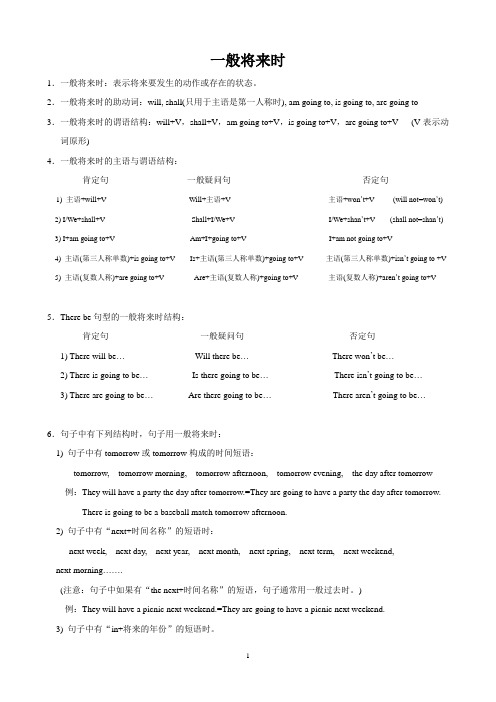
一般将来时1.一般将来时:表示将来要发生的动作或存在的状态。
2.一般将来时的助动词:will, shall(只用于主语是第一人称时), am going to, is going to, are going to3.一般将来时的谓语结构:will+V,shall+V,am going to+V,is going to+V,are going to+V (V表示动词原形)4.一般将来时的主语与谓语结构:肯定句一般疑问句否定句1) 主语+will+V Will+主语+V 主语+won’t+V (will not=won’t)2) I/We+shall+V Shall+I/We+V I/We+shan’t+V (shall not=shan’t)3) I+am going to+V Am+I+going to+V I+am not going to+V4) 主语(第三人称单数)+is going to+V Is+主语(第三人称单数)+going to+V 主语(第三人称单数)+isn’t going to +V5) 主语(复数人称)+are going to+V Are+主语(复数人称)+going to+V 主语(复数人称)+aren’t going to+V5.There be句型的一般将来时结构:肯定句一般疑问句否定句1) There will be…Will there be…There won’t be…2) There is going to be…Is there going to be…There isn’t going to be…3) There are going to be…Are there going to be…There aren’t going to be…6.句子中有下列结构时,句子用一般将来时:1) 句子中有tomorrow或tomorrow构成的时间短语:tomorrow, tomorrow morning, tomorrow afternoon, tomorrow evening, the day after tomorrow 例:They will have a party the day after tomorrow.=They are going to have a party the day after tomorrow.There is going to be a baseball match tomorrow afternoon.2) 句子中有“next+时间名称”的短语时:next week, next day, next year, next month, next spring, next term, next weekend,next morning…….(注意:句子中如果有“the next+时间名称”的短语,句子通常用一般过去时。
一般将来时

一般将来时一、一般将来时表示将来某个时间要发生的动作或存在的状态,也可以表示将来经常或重复发生的动作,常与表示将来的时间状语连用。
二、一般将来时的构成:1.主语+be(am/is/are) going to+动词原形该结构用来表示按照主观意图打算或按计划安排将要做的事,有打算”、“就要”的意思。
也常用于表示从迹象上表明将要发生的事情,多指个人主观臆断的推测。
例如:Look at the clouds, It's going to rain.看那些云,要下雨了。
2.主语+wil/ shall+动词原形该结构指对将来事物近期或远期的预见,表达个人主观意图以及征求对方意见,或表示客气的邀请。
在书面语中,shaII多用于第一人称:在口语中,will可以用于任何人称。
例如:I shall/ will show my photos to you next Monday.我下周一给你看我的照片。
三、一般将来时句型转换:1.否定句,主语+will/shall+not+动词原形;主语+am/is/are +not going to+动词原形。
例如:1) Our teacher won't come back very soon.我们老师不会很快回来的。
2) They are not going to play football this afternoon.他们不打算今天下午去踢球。
2.一般疑问句,Am/ls/are+主语+ -going t+动词原形+… Will /Shall+主语+动词原形+…?。
例如:1) Will our teacher come back very soon?我们老师会很快回来吗?2) Are they going to play football this afternoon?他们打算今天下午踢球吗3.特殊疑问句,疑问词(hat/ Where/how/.m/is/are+主语+ going to+动词原形+…?;疑问词(what/ Where/how/...)+will/shall+主语+动词原形+…?。
完整版)一般将来时基本用法
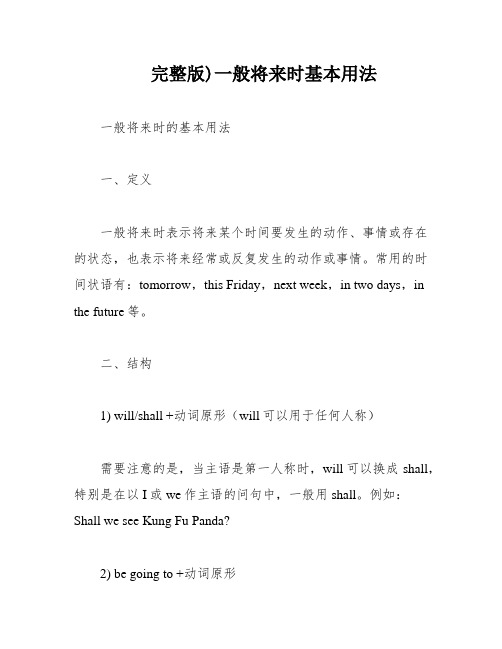
完整版)一般将来时基本用法一般将来时的基本用法一、定义一般将来时表示将来某个时间要发生的动作、事情或存在的状态,也表示将来经常或反复发生的动作或事情。
常用的时间状语有:tomorrow,this Friday,next week,in two days,in the future等。
二、结构1) will/shall +动词原形(will可以用于任何人称)需要注意的是,当主语是第一人称时,will可以换成shall,特别是在以I或we作主语的问句中,一般用shall。
例如:Shall we see Kung Fu Panda?2) be going to +动词原形例如:I’m going to play the piano。
be going to和will的区别be going to和will的用法虽然都表示将来发生动作或情况,一般情况下能互换。
但它们的用法是有区别的。
be going to主要用于:1、表示事先经过考虑、安排好打算、计划要做的事情。
例如:Dad and I are going to watch an opera this afternoon.2、表示根据目前某种迹象判断,某事非常有可能发生。
例如:Look。
There come the dark clouds。
It is going to rain.三、一般疑问句和否定句一般疑问句:1) will/shall +动词原形(will可以用于任何人称)——在will后加not2) be going to +动词原形——在be后加not例如:She will come back in three days.Will she not come back in three days?They are going to clean their classroom.Are they not going to clean their classroom?否定句:1) will/shall +动词原形(will可以用于任何人称)——将will提前2) be going to +动词原形——将be提前例如:She will come back in three days.She will not come back in three days.Will she come back in three days?XXX is whether they will actually do it。
初二英语语法分析--一般将来时用法讲解
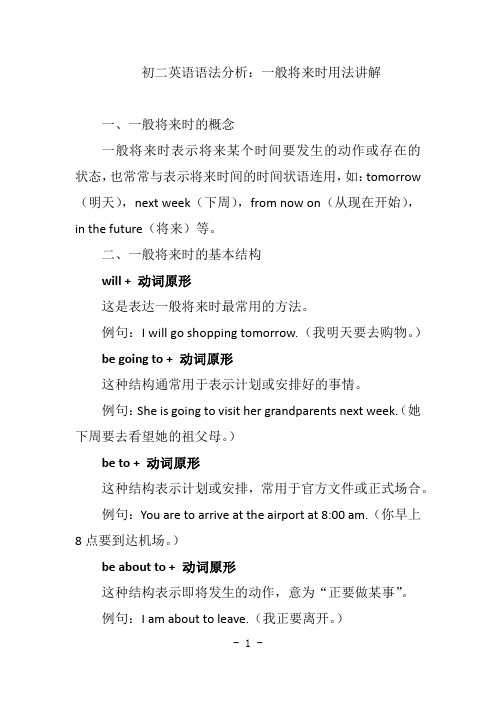
初二英语语法分析:一般将来时用法讲解一、一般将来时的概念一般将来时表示将来某个时间要发生的动作或存在的状态,也常常与表示将来时间的时间状语连用,如:tomorrow (明天),next week(下周),from now on(从现在开始),in the future(将来)等。
二、一般将来时的基本结构will + 动词原形这是表达一般将来时最常用的方法。
例句:I will go shopping tomorrow.(我明天要去购物。
)be going to + 动词原形这种结构通常用于表示计划或安排好的事情。
例句:She is going to visit her grandparents next week.(她下周要去看望她的祖父母。
)be to + 动词原形这种结构表示计划或安排,常用于官方文件或正式场合。
例句:You are to arrive at the airport at 8:00 am.(你早上8点要到达机场。
)be about to + 动词原形这种结构表示即将发生的动作,意为“正要做某事”。
例句:I am about to leave.(我正要离开。
)be due to + 动词原形这种结构表示某事预定或预期将要发生。
例句:The train is due to arrive at 5:00 pm.(火车预定下午5点到达。
)三、一般将来时的用法1表示将来的动作或状态例句:I will buy a new car next year.(明年我要买一辆新车。
)2表示将来的计划或安排例句:We are going to have a picnic this weekend.(我们这个周末要去野餐。
)3表示根据现有情况推测未来的可能性例句:It's going to rain soon.(很快就要下雨了。
)4表示命令、请求、建议等例句:You are to finish your homework before you go out.(你出去之前要把作业做完。
一般将来时的使用方法是什么
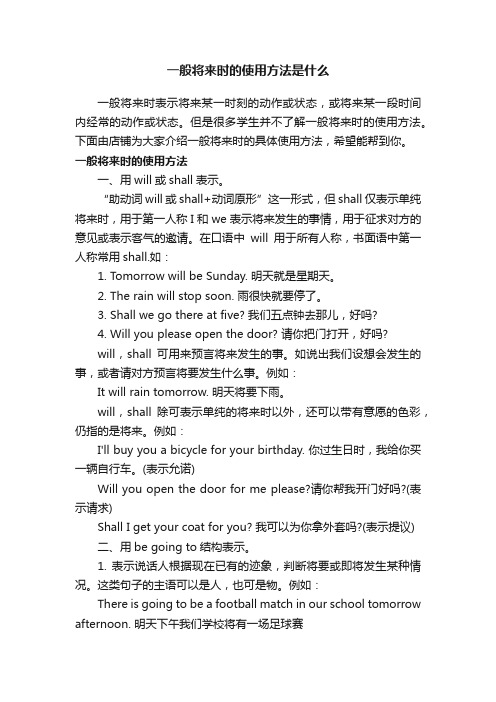
一般将来时的使用方法是什么一般将来时表示将来某一时刻的动作或状态,或将来某一段时间内经常的动作或状态。
但是很多学生并不了解一般将来时的使用方法。
下面由店铺为大家介绍一般将来时的具体使用方法,希望能帮到你。
一般将来时的使用方法一、用will或shall表示。
“助动词will或shall+动词原形”这一形式,但shall 仅表示单纯将来时,用于第一人称I和we表示将来发生的事情,用于征求对方的意见或表示客气的邀请。
在口语中will用于所有人称,书面语中第一人称常用shall.如:1. Tomorrow will be Sunday. 明天就是星期天。
2. The rain will stop soon. 雨很快就要停了。
3. Shall we go there at five? 我们五点钟去那儿,好吗?4. Will you please open the door? 请你把门打开,好吗?will,shall可用来预言将来发生的事。
如说出我们设想会发生的事,或者请对方预言将要发生什么事。
例如:It will rain tomorrow. 明天将要下雨。
will,shall除可表示单纯的将来时以外,还可以带有意愿的色彩,仍指的是将来。
例如:I'll buy you a bicycle for your birthday. 你过生日时,我给你买一辆自行车。
(表示允诺)Will you open the door for me please?请你帮我开门好吗?(表示请求)Shall I get your coat for you? 我可以为你拿外套吗?(表示提议)二、用be going to结构表示。
1. 表示说话人根据现在已有的迹象,判断将要或即将发生某种情况。
这类句子的主语可以是人,也可是物。
例如:There is going to be a football match in our school tomorrow afternoon. 明天下午我们学校将有一场足球赛(已有告示)I feel terrible.I think I'm going to die. 我感到难受极了,我想我快不行了。
一般将来时态知识点详解(初中英语专项复习) (4)
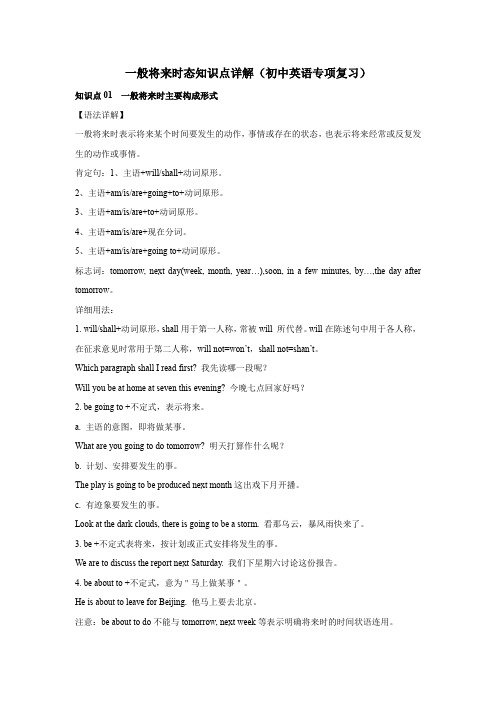
一般将来时态知识点详解(初中英语专项复习)知识点01 一般将来时主要构成形式【语法详解】一般将来时表示将来某个时间要发生的动作,事情或存在的状态,也表示将来经常或反复发生的动作或事情。
肯定句:1、主语+will/shall+动词原形。
2、主语+am/is/are+going+to+动词原形。
3、主语+am/is/are+to+动词原形。
4、主语+am/is/are+现在分词。
5、主语+am/is/are+going to+动词原形。
标志词:tomorrow, next day(week, month, year…),soon, in a few minutes, by…,the day after tomorrow。
详细用法:1. will/shall+动词原形,shall用于第一人称,常被will 所代替。
will在陈述句中用于各人称,在征求意见时常用于第二人称,will not=won’t,shall not=shan’t。
Which paragraph shall I read first? 我先读哪一段呢?Will you be at home at seven this evening? 今晚七点回家好吗?2. be going to +不定式,表示将来。
a. 主语的意图,即将做某事。
What are you going to do tomorrow? 明天打算作什么呢?b. 计划、安排要发生的事。
The play is going to be produced next month这出戏下月开播。
c. 有迹象要发生的事。
Look at the dark clouds, there is going to be a storm. 看那乌云,暴风雨快来了。
3. be +不定式表将来,按计划或正式安排将发生的事。
We are to discuss the report next Saturday. 我们下星期六讨论这份报告。
初中英语一般将来时专项语法讲解
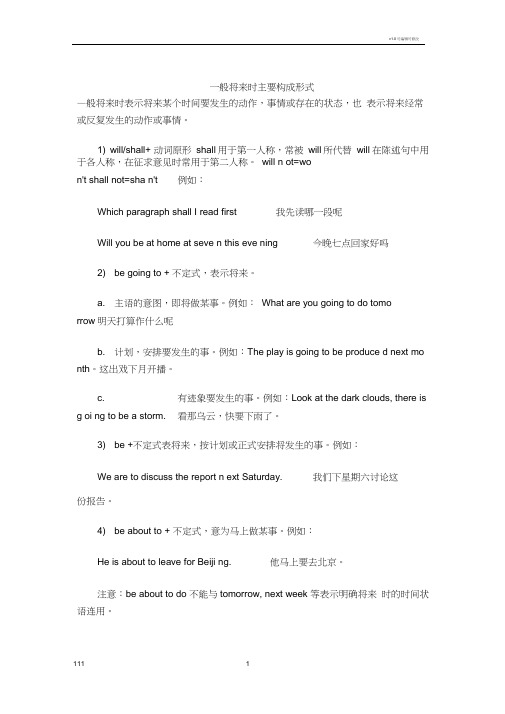
一般将来时主要构成形式—般将来时表示将来某个时间要发生的动作,事情或存在的状态,也表示将来经常或反复发生的动作或事情。
1) will/shall+ 动词原形shall用于第一人称,常被will所代替will在陈述句中用于各人称,在征求意见时常用于第二人称。
will n ot=won't shall not=sha n't 例如:Which paragraph shall I read first 我先读哪一段呢Will you be at home at seve n this eve ning 今晚七点回家好吗2) be going to + 不定式,表示将来。
a. 主语的意图,即将做某事。
例如:What are you going to do tomorrow明天打算作什么呢b. 计划,安排要发生的事。
例如:The play is going to be produce d next mo nth。
这出戏下月开播。
c. 有迹象要发生的事。
例如:Look at the dark clouds, there is g oi ng to be a storm. 看那乌云,快要下雨了。
3) be +不定式表将来,按计划或正式安排将发生的事。
例如:We are to discuss the report n ext Saturday. 我们下星期六讨论这份报告。
4) be about to + 不定式,意为马上做某事。
例如:He is about to leave for Beiji ng. 他马上要去北京。
注意:be about to do 不能与tomorrow, next week 等表示明确将来时的时间状语连用。
Notice:be to 和be going tobe to表示客观安排或受人指示而做某事,be going to 表示主观的打算或计划。
例如:I am to play football tomorrow after noon. 明天下午我去踢球。
八年级英语一般将来时用法
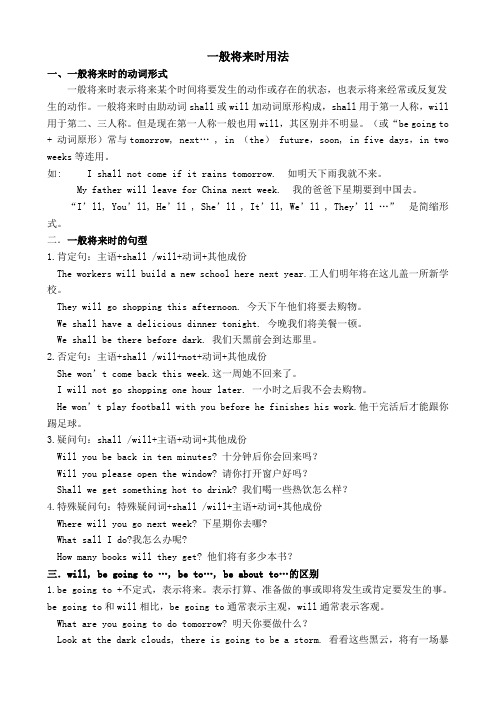
一般将来时用法一、一般将来时的动词形式一般将来时表示将来某个时间将要发生的动作或存在的状态,也表示将来经常或反复发生的动作。
一般将来时由助动词shall或will加动词原形构成,shall用于第一人称,will 用于第二、三人称。
但是现在第一人称一般也用will,其区别并不明显。
(或“be going to + 动词原形)常与tomorrow, next… , in (the) future,soon, in five days,in two weeks等连用。
如: I shall not come if it rains tomorrow. 如明天下雨我就不来。
My father will leave for China next week. 我的爸爸下星期要到中国去。
“I’ll, You’ll, He’ll , She’ll , It’ll, We’ll , They’ll …”是简缩形式。
二.一般将来时的句型1.肯定句:主语+shall /will+动词+其他成份The workers will build a new school here next year.工人们明年将在这儿盖一所新学校。
They will go shopping this afternoon. 今天下午他们将要去购物。
We shall have a delicious dinner tonight. 今晚我们将美餐一顿。
We shall be there before dark. 我们天黑前会到达那里。
2.否定句:主语+shall /will+not+动词+其他成份She won’t come back this week.这一周她不回来了。
I will not go shopping one hour later. 一小时之后我不会去购物。
He won’t play football with you before he finishes his work.他干完活后才能跟你踢足球。
一般将来时知识点
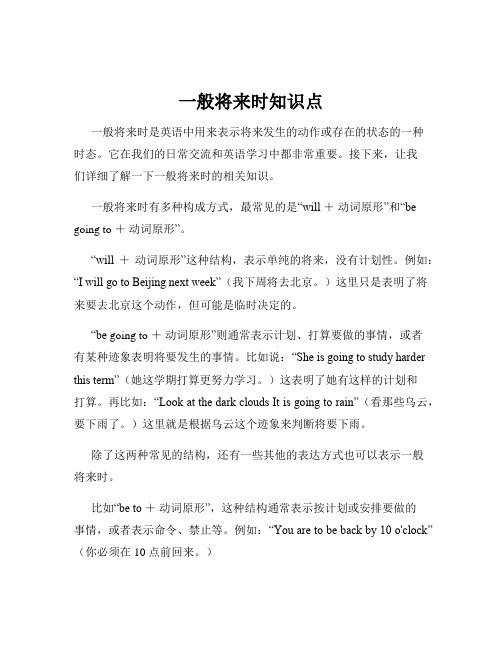
一般将来时知识点一般将来时是英语中用来表示将来发生的动作或存在的状态的一种时态。
它在我们的日常交流和英语学习中都非常重要。
接下来,让我们详细了解一下一般将来时的相关知识。
一般将来时有多种构成方式,最常见的是“will +动词原形”和“be going to +动词原形”。
“will +动词原形”这种结构,表示单纯的将来,没有计划性。
例如:“I will go to Beijing next week”(我下周将去北京。
)这里只是表明了将来要去北京这个动作,但可能是临时决定的。
“be going to +动词原形”则通常表示计划、打算要做的事情,或者有某种迹象表明将要发生的事情。
比如说:“She is going to study harder this term”(她这学期打算更努力学习。
)这表明了她有这样的计划和打算。
再比如:“Look at the dark clouds It is going to rain”(看那些乌云,要下雨了。
)这里就是根据乌云这个迹象来判断将要下雨。
除了这两种常见的结构,还有一些其他的表达方式也可以表示一般将来时。
比如“be to +动词原形”,这种结构通常表示按计划或安排要做的事情,或者表示命令、禁止等。
例如:“You are to be back by 10 o'clock”(你必须在 10 点前回来。
)“be about to +动词原形”表示即将发生的动作,通常不与具体的时间状语连用。
例如:“The film is about to start”(电影即将开始。
)在使用一般将来时的时候,要注意时间状语的搭配。
常见的时间状语有:tomorrow(明天)、next week(下周)、in the future(在未来)、soon(很快)等等。
另外,一般将来时的否定形式和疑问形式也有一定的规律。
“will +动词原形”的否定形式是“will not(won't)+动词原形”,疑问形式是把“will”提到主语前面。
一般将来时的用法
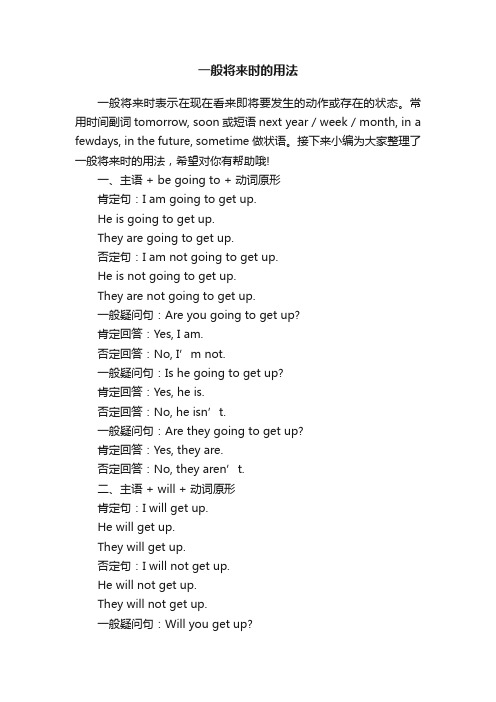
一般将来时的用法一般将来时表示在现在看来即将要发生的动作或存在的状态。
常用时间副词tomorrow, soon或短语next year / week / month, in a fewdays, in the future, sometime 做状语。
接下来小编为大家整理了一般将来时的用法,希望对你有帮助哦!一、主语 + be going to + 动词原形肯定句:I am going to get up.He is going to get up.They are going to get up.否定句:I am not going to get up.He is not going to get up.They are not going to get up.一般疑问句:Are you going to get up?肯定回答:Yes, I am.否定回答:No, I’m not.一般疑问句:Is he going to get up?肯定回答:Yes, he is.否定回答:No, he isn’t.一般疑问句:Are they going to get up?肯定回答:Yes, they are.否定回答:No, they aren’t.二、主语 + will + 动词原形肯定句:I will get up.He will get up.They will get up.否定句:I will not get up.He will not get up.They will not get up.一般疑问句:Will you get up?肯定回答:Yes, I will.否定回答:No, I won’t.一般疑问句:Will he get up.肯定回答:Yes, he will.否定回答:No, he won’t.一般疑问句:Are they going to get up?肯定回答:Yes, they are.否定回答:No, they aren’t.一般将来时/式(The Simple Future tense)时态定义be going to表主观的打算shall和will常常缩写成'll ,紧接在主语之后。
一般将来时的用法

一般将来时的用法一般将来时表示将来某一时刻的动作或状态,或将来某一段时间内经常的动作或状态。
一般将来时的用法有哪些呢?本文是店铺整理一般将来时的用法的资料,仅供参考。
一般将来时的用法一般将来时表示将来某一时刻的动作或状态,或将来某一段时间内经常的动作或状态.常常和表示将来的时间状语连用.如:tomorrow(明天),next week(下周),from now on(从现在开始);in the future(将来)等.一般将来时由助动词shall(第一人称),will(第二、三人称) 动词原形构成.美国英语则不管什么人称,一律用will.用法:(1)一般将来时表示将要发生的动作或情况.例如:I will(shall) arrive tomorrow.我明天到.Will you be free tonight?你今晚有空吗?We won’t (shan’t) be busy this evening.我们今晚不忙.(2)在一般将来时的句子中,有时有表示将来时间的状语,有时没有时间状语,这时要从意思上判断是否指未来的动作或情况.例如:Will she come?她(会)来吗?We’ll only stay for two weeks.我们只待两星期.The meeting won’t last long.会开不了多久.(3)在以第一人称I或we作主语的问句中,一般使用助动词shall,这时或是征求对方的意见(a),或是询问一个情况(b):a.Where shall we meet?我们在哪儿碰头?b.Shall we have any classes tomorrow?明天我们有课吗?在这类问句中,近年来也有不少人用will,特别是在美国.例如:How will I get there?我怎么去?(4)be going to 动词原形 a.表示计划、打算、准备做的事.例如:We are going to put up a building here.我们打算在这里盖一座楼.How are you going to spend your holidays?假期你准备怎样过?b.表示即将发生或肯定要发生的事.例如:I think it is going to snow.我看要下雪了.There’s going to be a lot of trouble about this.这事肯定会有很多麻烦.一般将来时的其他用法一般将来时表示将来某一时刻的动作或状态,其表达形式除了“shall(第一人称),will(第二、三人称)+动词原形构成”外,还有以下几种形式.一.“be going to+动词原形”表示即将发生的或最近打算进行的事.例如:①It is going to rain.要下雨了.②We are going to ha ve a meeting today.今天我们开会.二.go,come,start,move,sail,leave,arrive,stay,live,fly,等可用进行时态表示按计划即将发生的动作,例如:I'm leaving for Beijing.我要去北京.三.“be to+动词原形”表示按计划要发生的事或征求对方意见.例如:①Are we to go on with this work?我们继续干吗?②The boy is to go to school tomorrow.这个男孩明天要去上学.四.“be about to+动词原形”表示即将发生的动作,意为:很快,马上.后面一般不跟时间状语.例如:We are about to leave.我们马上就走.五.某些词,如come,go,leave,arrive,start,get,stay ,live,fly等的一般现在时也可表示将来.①The meeting starts at five o'clock.会议五点开始.②He gets off at the next stop.他下一站下车.六.“be due to"构成的谓语,意味“定于…”也可表示将来时.百度百科上有详细介绍,很全面的哦.一般将来时基本用法一般将来时构成如下:肯定式疑问式否定式疑问否定式I shall work Shall i work? I shall not work Shall i not work? He(she,it) Will he (she,it) He(she,it)will not Will he (she,it) not We shall work Shall we work? We shall not work Shall we not work? You will work Will you work? You will not work Will you not work? They will work Will they work? They will not work Will they not work?其结构有如下几种: 1)will + 动词原形(will可以用于任何人称) 需要注意的是当主语是第一人称时will可以换成shall,特别是在以I或we 作主语的问句中,一般用shall. 例. Shall we go to the zoo? 2)be going to +动词原形第一种结构的句式变化是: 变否定句在will后边加not. 变一般疑问句把will提前. e.g. She will come back in three days. She will not come back in three days. Will She come back in three days? 第二种结构的句式变化要在be上做文章. E.g. They are going to clean their classroom. They are not going to clean their classroom. Are they going to clean their classroom?一般将来时基本用法如下:1 一般将来时用来表示纯粹的将来事实。
一般将来时用法

一般将来时用法一、一般将来时的动词形式一般将来时表示将来某个时间将要发生的动作或存在的状态,也表示将来经常或反复发生的动作。
will, be going to …, be to…, be about to都可以用来表示一般将来时。
一般将来时由助动词shall或will加动词原形构成,shall用于第一人称(____________,_______________),will用于第二、三人称。
但是现在第一人称一般也用will,其区别并不明显。
(或“be going to + 动词原形)常与tomorrow, next… , in (the) future,soon, in five days,in two weeks等连用。
如: I shall not come if it rains tomorrow. 如明天下雨我就不来。
My father will leave for China next week. 我的爸爸下星期要到中国去。
“I’ll, You’ll, He’ll , She’ll , It’ll, We’ll , They’ll …”是简缩形式。
二.一般将来时的句型1.肯定句:主语+shall /will+动词+其他成份The workers will build a new school here next year.工人们明年将在这儿盖一所新学校。
They will go shopping this afternoon. 今天下午他们将要去购物。
We shall have a delicious dinner tonight. 今晚我们将美餐一顿。
We shall be there before dark. 我们天黑前会到达那里。
2.否定句:主语+shall /will+not+动词+其他成份She won’t come back this week.这一周她不回来了。
I will not go shopping one hour later. 一小时之后我不会去购物。
一般将来时
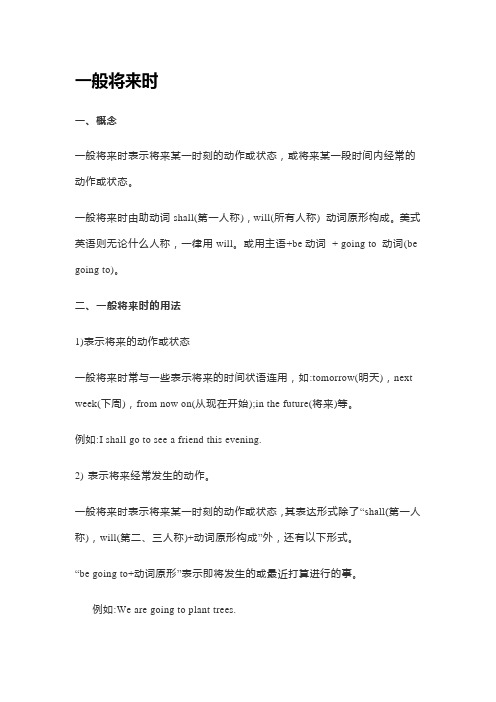
一般将来时一、概念一般将来时表示将来某一时刻的动作或状态,或将来某一段时间内经常的动作或状态。
一般将来时由助动词shall(第一人称),will(所有人称) 动词原形构成。
美式英语则无论什么人称,一律用will。
或用主语+be动词+ going to 动词(be going to)。
二、一般将来时的用法1)表示将来的动作或状态一般将来时常与一些表示将来的时间状语连用,如:tomorrow(明天),next week(下周),from now on(从现在开始);in the future(将来)等。
例如:I shall go to see a friend this evening.2)表示将来经常发生的动作。
一般将来时表示将来某一时刻的动作或状态,其表达形式除了“shall(第一人称),will(第二、三人称)+动词原形构成”外,还有以下形式。
“be going to+动词原形”表示即将发生的或最近打算进行的事。
例如:We are going to plant trees.三、一般将来时的句型①肯定句:主语+ be going to do /will/shall+ 动词原形②否定句:主语+ be not going to do /will not/shall not+ 动词原形③疑问句:Be动词+主语+ going to do /Will/Shall+主语+ 动词原形简略回答:(肯)Yes,主语shall/will (否) No,主语+shan't/won't④特殊疑问句:特殊疑问词+一般疑问句(就主语提问时,以疑问词who开头的疑问词除外)----- Why will you be here on Sunday?(周日你为什么将要在这儿?)-----I will have a meeting on Sunday(我将要在周日举行一个聚会)(对特殊疑问句要进行具体回答)一般疑问句:be或will提到句首,some改any,and改or,第一二人称互换We are going to go on an outing this weekend.-------Are you going to go on an outing this weekend?被动句:will/shall+be+v.ed(及物动词过去分词)The letter will be sent tomorrow.这封信明天将寄出去We shall be punished if we break the rule.如果我们违反规定,我们将受到惩罚。
“一般将来时”的几种语法形式
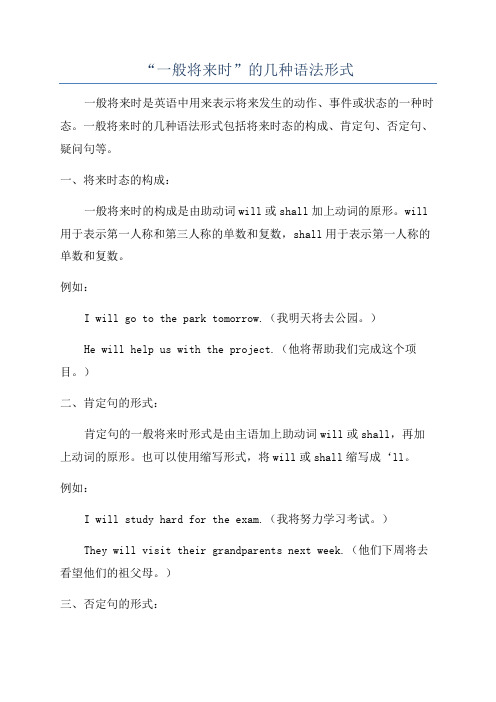
“一般将来时”的几种语法形式一般将来时是英语中用来表示将来发生的动作、事件或状态的一种时态。
一般将来时的几种语法形式包括将来时态的构成、肯定句、否定句、疑问句等。
一、将来时态的构成:一般将来时的构成是由助动词will或shall加上动词的原形。
will 用于表示第一人称和第三人称的单数和复数,shall用于表示第一人称的单数和复数。
例如:I will go to the park tomorrow.(我明天将去公园。
)He will help us with the project.(他将帮助我们完成这个项目。
)二、肯定句的形式:肯定句的一般将来时形式是由主语加上助动词will或shall,再加上动词的原形。
也可以使用缩写形式,将will或shall缩写成‘ll。
例如:I will study hard for the exam.(我将努力学习考试。
)They will visit their grandparents next week.(他们下周将去看望他们的祖父母。
)三、否定句的形式:否定句的一般将来时形式是由主语加上助动词will not或won’t,再加上动词的原形。
例如:I will not go to the party tonight.(我今晚不去参加派对。
)四、疑问句的形式:疑问句的一般将来时形式是将助动词will或shall置于主语之前。
例如:Will you join us for dinner?(你会和我们一起吃晚餐吗?)Shall we go to the movies?(我们去看电影好吗?)五、其他形式:除了will和shall之外,一般将来时还可以使用一些其他词组来表示将来的动作、事件或状态。
例如be going to,be about to等。
1. be going to+动词原形be going to+动词原形表示计划、打算、意图或预测将要发生的事情。
例如:She is going to travel around the world next year.(明年她将要周游世界。
一般将来时
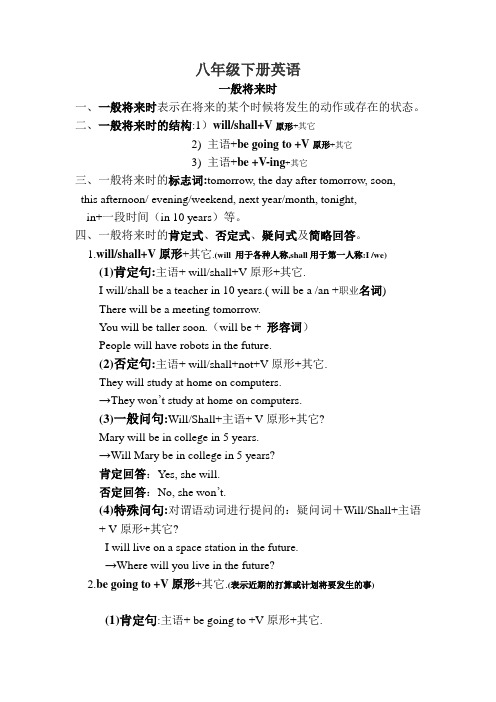
八年级下册英语一般将来时一、一般将来时表示在将来的某个时候将发生的动作或存在的状态。
二、一般将来时的结构:1)will/shall+V原形+其它2) 主语+be going to +V原形+其它3) 主语+be +V-ing+其它三、一般将来时的标志词:tomorrow, the day after tomorrow, soon,this afternoon/ evening/weekend, next year/month, tonight,in+一段时间(in 10 years)等。
四、一般将来时的肯定式、否定式、疑问式及简略回答。
1.will/shall+V原形+其它.(will 用于各种人称,shall用于第一人称:I /we)(1)肯定句:主语+ will/shall+V原形+其它.I will/shall be a teacher in 10 years.( will be a /an +职业名词)There will be a meeting tomorrow.You will be taller soon.(will be + 形容词)People will have robots in the future.(2)否定句:主语+ will/shall+not+V原形+其它.They will study at home on computers.→They won’t study at home on computers.(3)一般问句:Will/Shall+主语+ V原形+其它?Mary will be in college in 5 years.→Will Mary be in college in 5 years?肯定回答:Yes, she will.否定回答:No, she won’t.(4)特殊问句:对谓语动词进行提问的:疑问词+Will/Shall+主语+ V原形+其它?I will live on a space station in the future.→Where will you live in the future?2.be going to +V原形+其它.(表示近期的打算或计划将要发生的事)(1)肯定句:主语+ be going to +V原形+其它.I am going to be a basketball player in the future.There is going to be a concert tonight.She is going to get good grades next year.(2)否定句:主语+ be +not +going to +V原形+其它.I am going to get lots of exercise this afernoon.→I am not going to get lots of exercise this afernoon.(3)一般问句:Be+主语+going to+V原形+其它?She is going to take acting lessons next year.→Is she going to take acting lessons next year?肯定回答:Yes, she is.否定回答:No , she isn’t.(4)特殊问句:疑问词+Be+主语+going to+V原形+其它?She is going to get good grades next year.→What is she going to do next year?3.be +V-ing+其它(主要用于go, come, leave, start等表示去向的短暂性动词)(1)肯定句:主语+ be+V-ing+其它.I am leaving for Beijing next month.(2)否定句:主语+ be+not+V-ing+其它.They are going to Tibet the day after tomorrow.→They aren’t going to Tibet the day after tomorrow.(3)一般问句:Be+主语+ V-ing+其它.?I am going hiking in the mountain next Sunday.→Are you going hiking in the mountain next Sunday?肯定回答:Yes, I am.否定回答:No, I am not.(4)特殊问句: 疑问词+Be+主语+ V-ing+其它.?He is going with his parents.→Who is he going with?一、单项选择。
一般将来时的用法详解
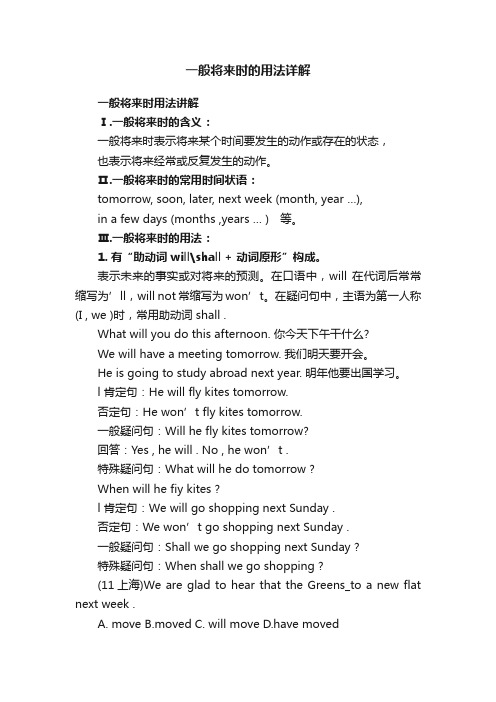
一般将来时的用法详解一般将来时用法讲解Ⅰ.一般将来时的含义:一般将来时表示将来某个时间要发生的动作或存在的状态,也表示将来经常或反复发生的动作。
Ⅱ.一般将来时的常用时间状语:tomorrow, soon, later, next week (month, year …),in a few days (months ,years … )等。
Ⅲ.一般将来时的用法:1. 有“助动词 will\shall + 动词原形”构成。
表示未来的事实或对将来的预测。
在口语中,will 在代词后常常缩写为’ll,will not 常缩写为won’t。
在疑问句中,主语为第一人称(I , we )时,常用助动词 shall .What will you do this afternoon. 你今天下午干什么?We will have a meeting tomorrow. 我们明天要开会。
He is going to study abroad next year. 明年他要出国学习。
l 肯定句:He will fly kites tomorrow.否定句:He won’t fly kites tomorrow.一般疑问句:Will he fly kites tomorrow?回答:Yes , he will . No , he won’t .特殊疑问句:What will he do tomorrow ?When will he fiy kites ?l 肯定句:We will go shopping next Sunday .否定句:We won’t go shopping next Sunday .一般疑问句:Shall we go shopping next Sunday ?特殊疑问句:When shall we go shopping ?(11上海)We are glad to hear that the Greens_to a new flat next week .A. moveB.movedC. will moveD.have moved( ) Who _____ we ____ swimming with tomorrow afternoon?A. will; goB. do; goC. will; goingD. shall; go2. 由“be going to + 动词原形”构成。
初中英语一般将来时专项语法讲解

初中英语一般将来时主要构成形式一般将来时表示将来某个时间要发生的动作,事情或存在的状态,也表示将来经常或反复发生的动作或事情。
1)will/shall+动词原形shall用于第一人称,常被will 所代替。
will 在陈述句中用于各人称,在征求意见时常用于第二人称。
will not=won't shall not=shan't例如:Which paragraph shall I read first?我先读哪一段呢?Will you be at home at seven this evening? 今晚七点回家好吗?2)be going to +不定式,表示将来。
a. 主语的意图,即将做某事。
例如:What are you going to do tomorrow? 明天打算作什么呢?b. 计划,安排要发生的事。
例如:The play is going to be produced next month。
这出戏下月开播。
c. 有迹象要发生的事。
例如:Look at the dark clouds, there is going to be a storm. 看那乌云,快要下雨了。
3)be +不定式表将来,按计划或正式安排将发生的事。
例如:We are to discuss the report next Saturday.我们下星期六讨论这份报告。
4)be about to +不定式,意为马上做某事。
例如:He is about to leave for Beijing. 他马上要去北京。
注意:be about to do 不能与tomorrow, next week 等表示明确将来时的时间状语连用。
Notice:be to和be going tobe to 表示客观安排或受人指示而做某事,be going to 表示主观的打算或计划。
例如:I am to play football tomorrow afternoon. 明天下午我去踢球。
- 1、下载文档前请自行甄别文档内容的完整性,平台不提供额外的编辑、内容补充、找答案等附加服务。
- 2、"仅部分预览"的文档,不可在线预览部分如存在完整性等问题,可反馈申请退款(可完整预览的文档不适用该条件!)。
- 3、如文档侵犯您的权益,请联系客服反馈,我们会尽快为您处理(人工客服工作时间:9:00-18:30)。
一般将来时用法
一、一般将来时的动词形式
一般将来时表示将来某个时间将要发生的动作或存在的状态,也表示将来经常或反复发生的动作。
一般将来时由助动词shall或will加动词原形构成,shall用于第一人称,will用于第二、三人称。
但是现在第一人称一般也用will,其区别并不明显。
(或“be going to + 动词原形)常与tomorrow, next… , in (the) future,soon, in five days,in two weeks等连用。
如: I shall not come if it rains tomorrow. 如明天下雨我就不来。
My father will leave for China next week. 我的爸爸下星期要到中国去。
“I’ll, You’ll, He’ll , She’ll , It’ll, We’ll , They’ll …”是简缩形式。
二.一般将来时的句型
1.肯定句:主语+shall /will+动词+其他成份
The workers will build a new school here next year.工人们明年将在这儿盖一所新学校。
They will go shopping this afternoon. 今天下午他们将要去购物。
We shall have a delicious dinner tonight. 今晚我们将美餐一顿。
We shall be there before dark. 我们天黑前会到达那里。
2.否定句:主语+shall /will+not+动词+其他成份
She won’t come back this week.这一周她不回来了。
I will not go shopping one hour later. 一小时之后我不会去购物。
He won’t play football with you before he finishes his work.他干完活后才能跟你踢足球。
3.疑问句:shall /will+主语+动词+其他成份
Will you be back in ten minutes? 十分钟后你会回来吗?
Will you please open the window? 请你打开窗户好吗?
Shall we get something hot to drink? 我们喝一些热饮怎么样?
4.特殊疑问句:特殊疑问词+shall /will+主语+动词+其他成份
Where will you go next week? 下星期你去哪?
What shall I do?我怎么办呢?
How many books will they get? 他们将有多少本书?
三.will, be going to …, be to…, be about to…的区别
1.be going to +不定式,表示将来。
表示打算、准备做的事或即将发生或肯定要发生的事。
be going to和will相比,be going to通常表示主观,will通常表示客观。
What are you going to do tomorrow? 明天你要做什么?
Look at the dark clouds, there is going to be a storm. 看看这些黑云,将有一场暴风雨。
It’s going to be a fine day tomorrow.明天将会是个好天。
It is going to rain. 要下雨了。
2.“be to+动词原形”表示按计划要发生的事或征求对方意见。
这种结构表示计划中约定的或按职责、义务要求必须去做的事或即将发生的动作。
We are to have a meeting next Saturday. 下个周日我们有个会。
The boy is to go to school tomorrow. 这个男孩明天要去上学。
Are we to go on with this work? 我们继续干吗?
The president is to visit China next week.总统下周来访中国。
3.“be about to+动词原形”表示即将发生的动作,意为:很快,马上。
后面一般不跟时间状语。
这一结构用于表示客观就要发生的事,表示马上就要发生。
一般不再与时间状语连用。
Don’t go out. We’re about to have a meeting. 别出去了,我们很快就开会了。
I was about to start when it began to rain.我刚要出发就下起雨来了。
He is about to leave for Shenyang.他将要离开去沈阳。
We are about to leave. 我们马上就走。
The film is about to begin. 电影马上就要开始了。
四.注意事项
1. be about to 不能与tomorrow, next week 等表示明确将来时的时间状语连用。
2. Let’s …的附加疑问通常使用“…, shall we ?”。
Let’s have a rest, shall we?
3. 问句是“Shall…?”,答句就用“shall ~”;问句用“Will …?”,答句就用“will ~ ”。
要前后保持一致。
Shall you go to school next week ?
Yes, I shall . We’ll have an exam .
Will you have an exam tomorrow?
Yes, I will. / No, I won’t.。
